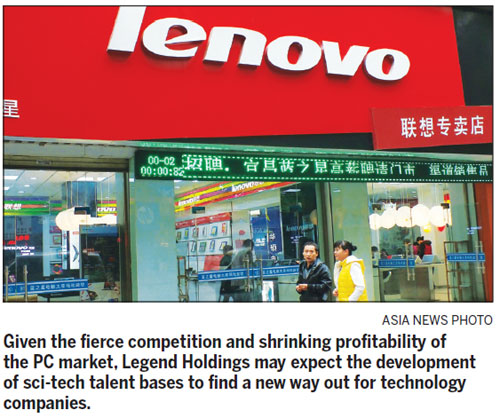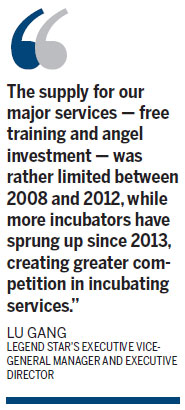Legend to build on 'China's Silicon Valley'
Updated: 2014-12-23 07:20
By Cheng Yingqi(HK Edition)
|
|||||||||

Legend Holdings Ltd - the parent company of Hong Kong-listed Lenovo Group Ltd - plans to play a bigger role in the central government's ambitious plan to duplicate Zhongguancun across the country by taking on more risky ventures.
"Legend Holdings started from Zhongguancun, and we had witnessed many enterprises starting from scratch. So I feel it's our obligation to help small- and medium-sized businesses when we are in a position to do so," said Liu Chuanzhi, founder and honorary chairman of Lenovo Group and chairman of Legend Holdings. "Legend Holdings and our incubator investment 'Legend Star' should play a bigger role in the duplication of Zhongguancun across China," he said.

Located in Beijing's Haidian district and called "China's Silicon Valley", Zhongguancun occupies an area of about 480 square kilometers and is the most intensive scientific, education and talent base in the country, with numerous high-tech companies, colleges, scientific institutions and State-level laboratories.
At a State Council executive meeting earlier this month, Premier Li Keqiang revealed a plan to extend six policies that have been piloted in Zhongguancun to encourage business innovation.
Legend Holdings started in the reception office of the Institute of Computing Technology Chinese Academy of Sciences (located in the central area in Zhongguancun) in 1984 with only 11 staff members.
By late last year, the company had created six subsidiary companies covering a wide range of businesses, including information technology, real estate development, financial services and agriculture.
Lenovo Group - China's largest maker of personal computers - is one of the affiliated companies.
To share its experience with startup companies, Legend launched an incubator project named Legend Star in 2008.
The project's aim was to help research fellows at colleges and institutes transfer their sci-tech research results into products and business by attending training sessions and receiving angel investment from Legend Star.
Shenzhen-based game enterprise iDreamSky Technology Ltd, which launched an initial public offering in the Nasdaq Global Select Market in August, received an 8-million-yuan ($1.3-million) angel investment from Legend Star in 2010, when the company was still an obscure outsourced game producer.
"In 2010, Apple Inc unveiled its smartphone iPhone 4, which I believe, signaled a revolution in wireless hardware," said Wang Mingyao, executive director of Legend Star.

Since then, Wang has kept looking for investment opportunities for mobile games and applications, and he was impressed by the high production value of iDreamSky.
Besides investments, Legend Star guided iDreamSky's development strategy in its infancy by supporting its game platform development and streamlining the company's management structure.
"We did have competitors in our iDreamSky venture. However, we invested 8 million yuan at one swoop, while other investors were only willing to put in no more than 1 million yuan on a company that was just capable of providing outsourcing services back then," Wang recalled.
Legend Star has so far incubated nine listed companies in the agriculture, healthcare, TMT (technology, media, and telecom) and advanced manufacturing sectors.
In the next five years, Legend Holdings plans to increase investments in Legend Star by 600 million yuan and raise funding to 1 billion yuan.
Legend Star, however, is only the tip of the iceberg of Zhongguancun's prosperous development. From 2012 to 2013, the value of public companies at Zhongguancun rose by 51 percent to 2.1 trillion yuan - equivalent to the annual GDP of Anhui province.
Zhongguancun's success story has lured many venture investors - about 9,000 startup businesses have opened up there so far this year, attracting 52.8-percent angel investment from across China, according to the central government's official website.
"New challenges have arisen in recent years as the government strengthens national policy support for the innovation business. The supply for our major services - free training and angel investment - was rather limited between 2008 and 2012, while more incubators have sprung up since 2013, creating greater competition in incubating services," said Lu Gang, Legend Star's executive vice-general manager and executive director.
Since 2012, Legend Star has cooperated with local governments in Suzhou, Tianjin and Shanghai to build incubator bases - to duplicate the development pattern of Zhongguancun.
Liu believes that in-depth cooperation with colleges and research institutions is the most important link in response to the rapidly changing business environment.
"Take Zhongguancun for example. Here we have Tsinghua University and Peking University, with which we can form an alliance to see what we can do in strengthening earlier investments in the Internet industry," he said.
chengyingqi@chinadaily.com.cn
(HK Edition 12/23/2014 page8)